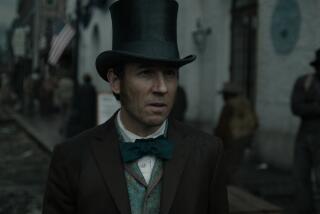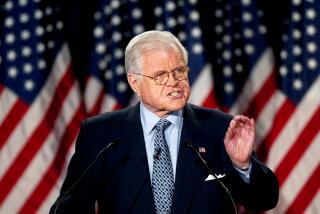Bugle Boy’s Story Exposes Little-Known Indulgent Side of Abe Lincoln
- Share via
WASHINGTON — President Lincoln had reviewed the troops outside Fredericksburg, Va., in April 1863 and was ready to leave. But his son, Tad, refused to go home if his new friend, a bugle boy, couldn’t come with him.
He pleaded. He cried.
“I want him to come home with me and teach me to ride and blow the bugle,” Tad whined to his father, who seemed unable to deny his son anything.
The commanding officer intervened to save Lincoln from the embarrassment of his son’s outburst. Gus Schurmann, one of the youngest soldiers to serve in the Union Army, was given a two-week furlough to go home with Tad as the boy’s playmate.
A new biography of Gus by historian William B. Styple--”The Little Bugler”--tells the story of the Civil War from the perspective of a boy who enlisted at age 12 and survived 10 battles. As the nation honors Lincoln’s 190th birthday this month, the book shows a side of Lincoln that is rarely remembered--that of an indulgent father.
The book, published in November, provides a look at the wartime White House where Lincoln and his wife, Mary, smiled on outrageous behavior by their children and allowed no one to discipline them.
Styple writes that Tad, in an effort to impress Gus, “fetched a small hatchet, said to be the one that little George Washington used to chop down the cherry tree. . . . He hacked at various pieces of furniture and finally sawed away the banisters of the main stairway.”
When servants reported the vandalism to Lincoln, he called the boys to his study but never said a word about the damage. Instead, he entertained them with stories about his service in the Black Hawk War of 1832, in which Indians fought the Illinois state government.
Later that day, Tad wanted to ask his father a question and burst into the Executive Office, where Lincoln was meeting with Secretary of State William Seward and Secretary of War Edwin M. Stanton. Gus followed behind.
Tad hugged his father, spoke to him briefly and then ran from the room. Gus saluted and left.
“Mr. Lincoln, are you not annoyed by those boys?” Seward asked.
“Oh, never mind,” Lincoln said as he smiled. “It’s a diversion, and we need diversion at the White House.”
According to Styple and Ruth Painter Randall, the author of the 1955 book “Lincoln’s Sons,” Tad and his older brother, nicknamed Willie, had the run not only of the White House but of the city. They did as they pleased, scandalizing Washington’s Victorian society, which thought that children should be seen rarely and heard never.
Mary Lincoln would say later that their child-rearing philosophy was that the children should be “free, happy and unrestrained by parental tyranny. Love is the chain whereby to bind a child to its parents.”
David Herbert Donald, in his book “Lincoln,” wrote that having children in the White House was something new to Americans, and Tad and Willie were showered with presents, particularly pet animals. Two goats, Nanko and Nanny, were great favorites.
“On one occasion, Tad harnessed Nanko to a chair which served him as a sled, and drove triumphantly through the East Room where a reception was in progress. As dignified matrons held up their hoop skirts, Nanko pulled the yelling boy around the room and out through the door again,” Donald wrote.
Tad, whose real name was Thomas, was 8 years old when he moved to the White House. Willie, his beloved playmate, was 11. After Willie’s death in 1862 from what was probably typhoid fever, the Lincolns focused all their attention on Tad.
On Gus’ visit, the two boys roamed the city. They attended several plays, including “The Marble Heart” at Grover’s Theater, starring John Wilkes Booth.
The boys were enthralled, according to Styple. “I’d like to meet that actor,” Tad said. “He makes you thrill.”
They rushed backstage after the second act to meet the handsome actor.
“Mr. Booth, this is President Lincoln’s son,” the stage manager said.
Booth chatted with them as he applied makeup for Act 3 and handed each boy a rose from a bunch passed to him from the audience.
Two years later, Tad was attending a play at the National Theater with his tutor when Booth shot his father at Ford’s Theater. With Lincoln’s death, the world of a loving father and the privileges of the White House were swept away.
Gus never again saw Tad Lincoln, who died in 1871 at the age of 18. But on Schurmann’s death, in 1905, the story of the bugle boy and the president’s son was told again in obituaries.
“Was Tad Lincoln’s Chum,” the New York Times headline said. The paper spelled his name differently than it appeared in his military records.
Of the boys’ meeting at a military camp, the story said: “Tad became interested in the boy in uniform who was only two years older than he, and soon made friends with him. In one instance, Schurman was said to have saved Tad’s life in a runaway [horse incident].
“However that may be, Lincoln invited the young bugler to go to the White House with them, and the two boys often played together.”
More to Read
Sign up for our Book Club newsletter
Get the latest news, events and more from the Los Angeles Times Book Club, and help us get L.A. reading and talking.
You may occasionally receive promotional content from the Los Angeles Times.










